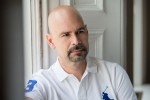Orlando Ortega-Medina’s characters explore far-flung places such as the bustling streets of Tokyo and the coast of Oregon.
But for alumnus Ortega-Medina, the global destinations in his short stories are not just locations for his characters to visit; they are also places he has lived himself.
Ortega-Medina will release his newest book, “Jerusalem Ablaze: Stories Of Love and Other Obsessions” on August 29 and will discuss the short stories at Diesel, A Bookstore on Aug. 31. The novel features 13 short stories that discuss topics such as sexuality and religion – a reflection on Ortega-Medina’s own experience of self-discovery while living around the world, he said.
“(I was) on a journey to live in different places in a search for myself,” he said.
[Related: Q&A: Author Geoff Dyer talks writing inspirations, literary success]
Ortega-Medina wanted to find his own culture ever since his youth, so he traveled around the globe to confront struggles in finding his religious, cultural and sexual identity, he said. The search for himself manifested in a literal search around the world.
“Many of us … suppress the very idea that we have a dark side, as if admitting to this will somehow make us worse human beings,” Ortega-Medina said. “In my view, hiding from something that is so close only makes us more vulnerable to it when it inevitably asserts itself.”
Ortega-Medina, who currently lives in London, was born in California and is of Judeo-Spanish descent. Growing up with immigrant parents meant the culture of his parents did not match the culture surrounding him, which lead him to question himself, he said.
“The culture of my parents was a very different culture from the culture in which I was raised, and even the culture in the home in which I was raised,” Ortega-Medina said. “I felt was always finding a way of distinguishing myself from my parents’ culture.”
Ortega-Medina graduated UCLA in 1988 with a degree in English and a concentration in creative writing, as well as an Asian humanities minor. He developed his prose and fiction writing in the English department, while his Asian humanities minor introduced him to translated Japanese literature.
His interest in Japanese literature and translation makes an appearance in one of his short stories when he refers to Hiro Mashima, a Japanese writer.
John Caruso, an alumnus who also graduated in 1988 with an English degree, took creative writing classes with Ortega-Medina. Caruso said he thinks Ortega-Medina’s connection to his characters and his passion for writing has been notable ever since his college days.
“His core interests and obsessions were firmly in place when we were undergraduates … but it’s deepened and matured and gotten even more provocative as we’ve gotten older,” Caruso said.
One of Ortega-Medina’s stories in the novel, “Cactuses,” reflects experiences people around him faced while he was a student at UCLA. The story, while fictitious, was inspired by a time in which some writing students were trying to get their work out to well-known authors living in the UCLA area.
Ortega-Medina’s other short stories reflect other parts of his life, including his residency in places such as Tokyo and Jerusalem. His personal experience with the local culture of each city inspired different stories. For example, the Israel setting written about in his short story “An Israel State of Mind” has a strong connection with the story’s plotline, but Ortega-Medina said the story is more reflective of his experience of the city rather than the actual city.
“The Israel of my story is not necessarily the Israel everybody else would experience, because it’s the way that it struck me at the time (I was) in it,” Ortega-Medina said.
David Mitchell, a rabbi of the synagogue Ortega-Medina attends, said he thinks “Jerusalem Ablaze” was a fascinating read because of how Ortega-Medina discussed topics such as sexuality.
“It’s a fascinating insight into the darker dimensions of people,” Mitchell said. “If we only stand in the light and don’t go into the shade, then we don’t fully appreciate the light.”
Alongside his current short story collection, Ortega-Medina has recently completed the first draft of a three-part black comedy about religion and the search for identity. In tune with his worldly destinations, the novel is set during the ’70s and ’80s and bounces between Los Angeles, Jerusalem and Tijuana, Mexico.
But whether the story takes place in Los Angeles or Jerusalem, Ortega-Medina said the therapeutic nature of writing it is still the same.
“All of those things were things that were buried deep inside, and I used my writing to draw these things out and put them (onto) the page,” Ortega-Medina said.
